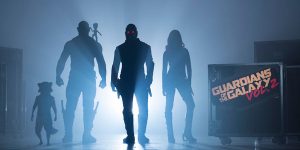
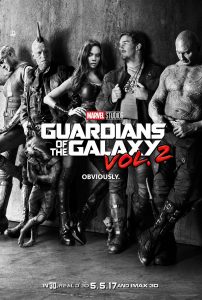 Every homeschooling family is unique. Some raise farm animals. Some attend symphony concerts. Some are heavily into sports. And one —– saves the galaxy. And most important to the homeschool family is — the father. I’ve said this before in other blogs, but I am happy to have the opportunity to say it again: A father (or father figure) in a family is irreplaceable and essential to a child’s development unless you want that child SERIOUSLY screwed up. No movie of recent history exemplifies this point more than the most recent Guardians of the Galaxy installment. I get that some families must persevere without a father – BUT given the vital role a father has in the home it is imperative that fatherless homes finds a wholesome father figure role model – brother, grandfather, priest, friend. Someone who can be turned to for counsel and, when needs be, protection.
Every homeschooling family is unique. Some raise farm animals. Some attend symphony concerts. Some are heavily into sports. And one —– saves the galaxy. And most important to the homeschool family is — the father. I’ve said this before in other blogs, but I am happy to have the opportunity to say it again: A father (or father figure) in a family is irreplaceable and essential to a child’s development unless you want that child SERIOUSLY screwed up. No movie of recent history exemplifies this point more than the most recent Guardians of the Galaxy installment. I get that some families must persevere without a father – BUT given the vital role a father has in the home it is imperative that fatherless homes finds a wholesome father figure role model – brother, grandfather, priest, friend. Someone who can be turned to for counsel and, when needs be, protection.
While Guardians of the Galaxy 2 is one of the most entertaining movies I have seen in a long time, there are serious underlying themes.
Please understand that the analysis below of the rather sobering themes explored in Guardians is not meant to imply that this is not a fun, funny, uplifting romp of a movie. I know the expression “feel good film” is more overused than “blockbuster” but you really WILL feel good when you come out. The movie is comedic, warm, and friendly, though a BIT too mature for the under 13 crowd. The violence is extensive but cartoonish and richly deserved by the recipients. No one takes themselves too seriously and tongue is planted firmly in cheek. I mean, how can you miss it when one of the characters is named EGO.
BEYOND HERE BE MASSIVE SPOILERS!!!!!!!!!!! FOR BOTH GUARDIANS!!!
I hate giving spoilers, so if you haven’t seen either of the Guardians movies wait to read this blog. But in order to do justice to the analysis of Guardians I have to get into spoiler-detail territory. If you continue – well, you’ve been warned. In addition, some of my comments rely on some short hand which only those who have seen the films will fully get.
On the homeschooling issue – it would have been easy to justify placing Baby Groot (YES! Still voiced by Vin Diesel)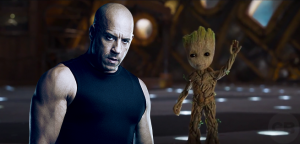 in some kind of protective custody environment. The hazards routinely taken by Baby Groot’s family of risk taking super hero parent/sibling models would have given the willies to the Flying Wallendas. Instead they work together to provide for the needs of Baby Groot, to nurture, protect and teach him all the while carrying on with killing scary critters and taking on fleets of homicidal bad guys. No one will watch your child the way you do. Your child is safer with you in a hazardous situation than they are with paid strangers in a “safe” environment.
in some kind of protective custody environment. The hazards routinely taken by Baby Groot’s family of risk taking super hero parent/sibling models would have given the willies to the Flying Wallendas. Instead they work together to provide for the needs of Baby Groot, to nurture, protect and teach him all the while carrying on with killing scary critters and taking on fleets of homicidal bad guys. No one will watch your child the way you do. Your child is safer with you in a hazardous situation than they are with paid strangers in a “safe” environment.
And integral to the successful homeschooling home, ideally, is the father.
The importance of a good father in the healthy upbringing of a child is featured in this Guardians sequel both for daughters as well as sons. Peter Quill (Chris Pratt) is “kidnapped” (and I’ll explain the quotes shortly) by Yondu (Michael Rooker) instead of returned to Peter’s appropriately named father, Ego, as Yondu had been paid to do. And so Peter was raised without his biological father.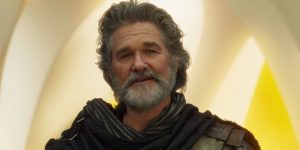
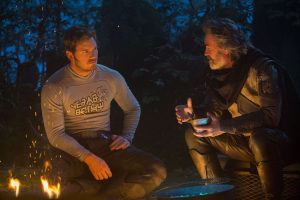 Ego, (Kurt Russell) presents himself to Peter, first, as a loving father, happily and finally reunited with the son he was denied by Yondu. In fact Ego has deliberately “seeded” himself both physically into the various planets he has visited as well as bred with many species across the galaxy in order to come up with the perfect child with which he can eliminate all life forms other than himself. He justifies this because he, himself, as far as he could tell, just “popped” into existence and has been traveling around, aimlessly, for millions of years – much like V-Ger in the first Star Trek movie, gaining a lot of knowledge but, it seems, very little wisdom. And with almost limitless power but without the guidance of a good father, Ego has become the embodiment of his name.
Ego, (Kurt Russell) presents himself to Peter, first, as a loving father, happily and finally reunited with the son he was denied by Yondu. In fact Ego has deliberately “seeded” himself both physically into the various planets he has visited as well as bred with many species across the galaxy in order to come up with the perfect child with which he can eliminate all life forms other than himself. He justifies this because he, himself, as far as he could tell, just “popped” into existence and has been traveling around, aimlessly, for millions of years – much like V-Ger in the first Star Trek movie, gaining a lot of knowledge but, it seems, very little wisdom. And with almost limitless power but without the guidance of a good father, Ego has become the embodiment of his name.
After thousands, or perhaps even millions, of attempts, Peter is Ego’s first progeny who is able to share Ego’s abilities. The others were killed in the trial process or murdered and discarded – we are never made clear on this creepy point. And – to make Ego even more evil – in order to stay true to his own perverted course, to sever all ties to anything which might distract him, he murders Peter’s mother by deliberately placing the tumor in her brain that kills her.
So – this heartless, selfish, sensualist alien playboys himself around the universe, wooing women in order to bed them, impregnating them, then abandons them and abuses the children. If this sounds more familiar than it should it’s because it is the repetitious refrain of almost every domestic abuse scenario in pretty much every single daily paper we read. While the story in Guardians is glamored up with a lot of extremely fun sci fi, that is exactly what happens. Boyfriend (not husband, mind you), impregnates a woman then returns, if at all, only to abuse the child and batter then kill the mother. While Ego doesn’t beat Peter’s mother, I would say that infesting her with a brain tumor definitely qualifies as battery.
It is interesting that the character of Ego is played by Kurt Russell, an actor who made his name as a child actor portraying family friendly, father supported characters. In all his cinematic years he seems to know how to demonstrate the need for a good father by showing us one with no fatherly attributes. 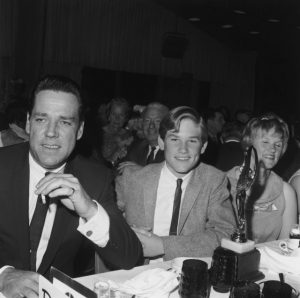
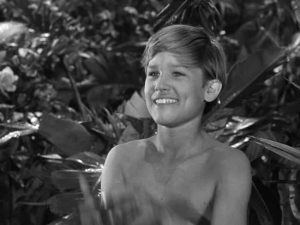
Ironically Ego is seeking “meaning” to his life. And cleverly, Peter expresses the thought about Gamora and Yondu that: “Sometimes the thing you want most is right next to you all the time.” The meaning Ego seeks he had found in Quill’s mother and the children he had bred. But he rejected all of them to serve is own enormous —– Ego.
Meanwhile, the sisters Gamora (Zoe Saldana, who also plays Uhura in the Star Trek reboot) and Nebula (Karen Gillian, unrecognizable under all the cybernetics from her stint as Amy Pond in the Matt Smith incarnation of Dr. Who) 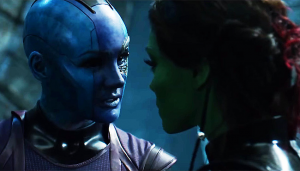
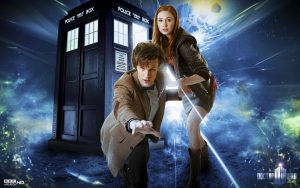 Duke it out both physically and verbally until it is revealed that Nebula’s cyborg implants are the result of her losses to Gamora in fights when they were children. Every time she was defeated by Gamora in the combats set up by their father, Thanos, he would perform grisly replacement surgeries on her – arm, spine, eye – purportedly to make her stronger. Once again, the warped relationship with the father mangles these women physically and emotionally, pitting them against each other in a twisted desire to glorify himself under the guise of “strengthening” them.
Duke it out both physically and verbally until it is revealed that Nebula’s cyborg implants are the result of her losses to Gamora in fights when they were children. Every time she was defeated by Gamora in the combats set up by their father, Thanos, he would perform grisly replacement surgeries on her – arm, spine, eye – purportedly to make her stronger. Once again, the warped relationship with the father mangles these women physically and emotionally, pitting them against each other in a twisted desire to glorify himself under the guise of “strengthening” them.
Once again, it all comes down to the father.
And if this weren’t enough, both Yondu and Rocket (Bradley Cooper) admit to each other that they were betrayed by THEIR “father figures” – Yondu by his parents who sold him into slavery and Rocket by those who created him only to torture him with genetic engineering. Rocket is another example, like Gamora and Nebula, of parent figures who try to warp their “child” into images of themselves. Yondu is another example of the abandoned child.
In the course of the film it is explained that Yondu did not kidnap Peter but, like a reformed abortionist, could no longer stomach what was happening to the children he was delivering to Ego and decided to take Peter as his own, hide him from Ego and raise him the best way he knew how. Being a pirate that fathering took some unusual turns but it is made clearly evident that Peter was, indeed, the recipient of some solid mentoring and fathering, given the hero he becomes.
As another counter to Ego’s bad father example, Drax nostalgically grieves for the daughter he has lost. And then there is Groot – who steals EVERY-SINGLE-SCENE he is in. Every member of the crew functions in a parental or sibling way. 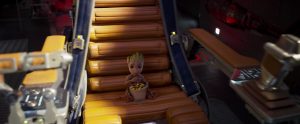 Peter tells him to put on his seat belt before going into combat, Gamora cautions him to get out of the way during a firefight then humors him with a smile and wave.
Peter tells him to put on his seat belt before going into combat, Gamora cautions him to get out of the way during a firefight then humors him with a smile and wave.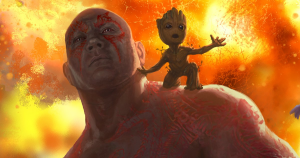
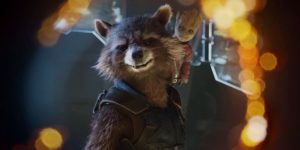 Drax and Rocket carry him on their shoulders, Rocket offers everything he has to the pirates who kidnap them just to ensure Groot’s survival, yet in other scenes Rocket listens carefully while Groot explains the origin of his discomfort with people who wear hats – all during a prison break, then later Rocket warns Groot that they will have to work on Groot’s tendency to use bad language (which we, of course, never hear because all he says are inflected variations of “I am Groot”). Groot’s healthy nurturing is underlined again in one of the post-credit scenes where Peter confronts a surly now-teenaged Groot sulking in his room with a computer game and Peter quips: “Now I know how Yondu felt,” acknowledging both his recognition of Yondu as his real father and the frustration of every parent at some point in the relationship between parent and adolescent child. These guys all demonstrate the importance of “being there” at the opportune moments in a child’s life when they need to be heard or chastized or sheltered or comforted or just held. And these moments are lost when a child is institutionally schooled.
Drax and Rocket carry him on their shoulders, Rocket offers everything he has to the pirates who kidnap them just to ensure Groot’s survival, yet in other scenes Rocket listens carefully while Groot explains the origin of his discomfort with people who wear hats – all during a prison break, then later Rocket warns Groot that they will have to work on Groot’s tendency to use bad language (which we, of course, never hear because all he says are inflected variations of “I am Groot”). Groot’s healthy nurturing is underlined again in one of the post-credit scenes where Peter confronts a surly now-teenaged Groot sulking in his room with a computer game and Peter quips: “Now I know how Yondu felt,” acknowledging both his recognition of Yondu as his real father and the frustration of every parent at some point in the relationship between parent and adolescent child. These guys all demonstrate the importance of “being there” at the opportune moments in a child’s life when they need to be heard or chastized or sheltered or comforted or just held. And these moments are lost when a child is institutionally schooled.
This is the most eccentric homeschooling family since Gomez and Morticia decided that Wednesday and Pugsly weren’t getting the background important to the Aadams’ family traditions. But Groot — well —- blossoms (pun intended) beautifully under the care of the Guardians.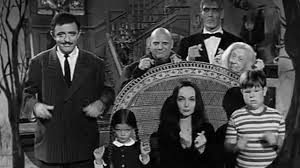
So, basically, what we have with Guardians is a super entertaining action adventure sci fi covering up a yin and yan of parenting and showing an unusual but thriving homeschool family. On the one hand you have the archetypal examples of bad father figures, represented by Ego and Thanos, who use their children instead of love them. On the other you have good parenting of the Guardians, who, ironically, represent almost every example of victims of bad parenting: abandoned, orphaned, abused, neglected, and used as extensions of their parents’ “Egos”, each of our crew has issues but rise above them to do their best to parent — Groot.
Yondu does his best to be a father substitute to Peter and makes the ultimate parental sacrifice of his life. Drax was brutally stripped of his children but becomes a protector to the other Guardians. All the abused children, from Yondu to Rocket, step up to do a better job with Groot, the child with which Fate has entrusted them. And we know Groot is in good hands because of the way they interact with him. One example of this bond is that the crew, despite the fact all Groot ever says is “I am Groot,” understands exactly, often in complex detail, what Groot is saying.
And this is what makes Guardians more than just another fun but forgettable adventure flick. The Guardians of the Galaxy are wonderful examples of how we can each do our own part to save the galaxy – one child at a time.
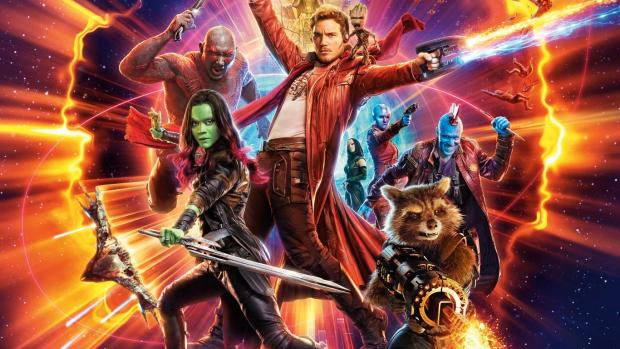
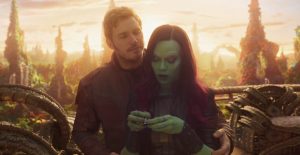
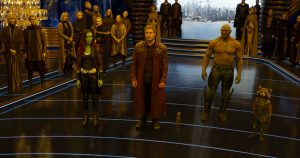
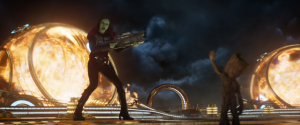
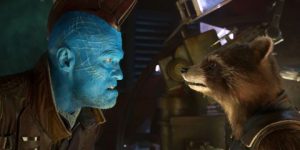
What an insightful post! I saw the movie yesterday so it was nice to relive some of the best scenes here on your blog. Excellent points on homeschooling and fatherhood.
Why – thank you kindly.